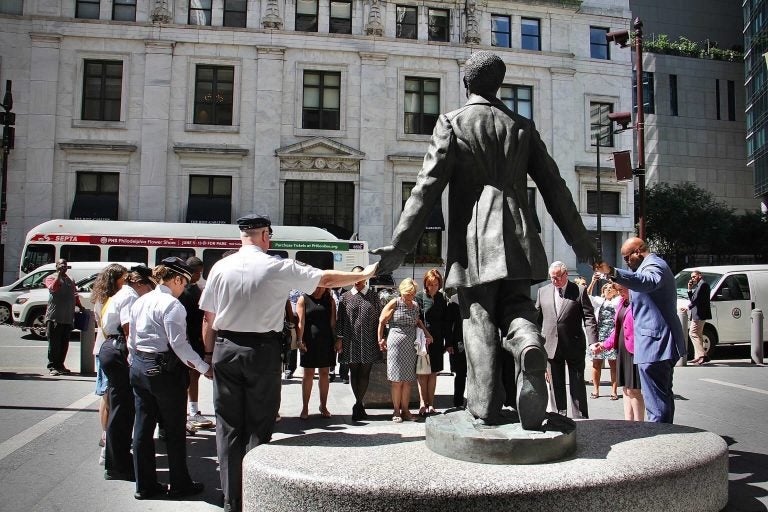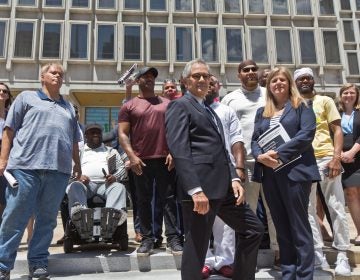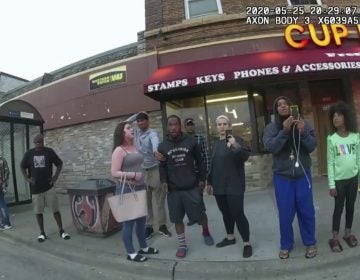Kenney offers sober progress report on Philly’s fight against systemic racism
Philadelphia’s Pathways to Reform, Transformation, and Reconciliation initiative took flight last summer in the wake of George Floyd’s murder.

City officials and members of the Pathways to Reform, Transformation and Reconciliation steering committee join hands at the Octavius Catto statue for a moment of silence. The committee was formed after the murder of George Floyd and the civil unrest that followed. (Emma Lee/WHYY)
For the past year, a committee of 48 city leaders and residents have been on a journey to make Philadelphia a more equitable city. They say they’ve made some strides already.
“Unpacking decades of systemic racism cannot simply be carried out in a single year, but we believe we are well on our way to learning from our past, taking accountability from our mistakes, and driving change that will make our government and our city for all Philadelphians,” Mayor Jim Kenney said Tuesday, as he and steering committee members offered an overview of progress made in the past year.
The city’s Pathways to Reform, Transformation, and Reconciliation initiative was inspired by the thousands of residents who took to the streets to protest police brutality, the killing of George Floyd, and systemic racism that exists in everything from policing to health care.
The steering committee prioritized reforming public safety, reducing the racial disparities worsened by COVID-19, kicking off a reconciliation process, and creating a more inclusive economy by strengthening businesses owned by people of color, women, and people with disabilities.
The committee touted its efforts to improve access to COVID-19 testing and vaccinations through nine community partners – though politicians and community leaders have argued the city could have done, and still could do, more to reach communities of color.
Similarly, officials said efforts such as the Philadelphia COVID-19 Small Business Relief Fund, with more than $13 million in grants available, distributed the bulk of grants to businesses owned by women and people of color, which were disproportionately rocked by the pandemic.
The city is also reviewing landmarks that don’t meet “inclusiveness, respect, or diversity” and recognizing Juneteenth as a city holiday.
To craft changes, the steering committee hosted 21 public events, which drew more than 2,000 people ready to talk about a wide range of topics from ways of reducing gun violence in the city to how to mourn the deaths of Black people killed by police including George Floyd and Breonna Taylor.
“We are a learning organization, and as such we are dedicated to creating and acquiring and modifying behaviors to reflect best practices in policing,” said Police Commissioner Danielle Outlaw. “It’s really often difficult to take a look in the mirror and see areas that need improvement, quite frankly.”
Still, Outlaw laid out a series of changes the department has already taken on. In June 2020, the department updated its chokehold policy – chokeholds were already banned – to prohibit the sitting or kneeling or sitting on a person’s neck, face, or head. That same month, the intentional pointing of a firearm was reclassified as a use of force that must be recorded.
After the tear-gassing of protestors on 676 and residents in West Philly, the department banned the use of tear gas on peaceful protestors. In September, no-knock warrant entries were prohibited. That same month, the department began to plan for a training that prepares officers to stop colleagues from engaging in unnecessary and harmful behavior while on the job.
In October, the department started to give PPD staff implicit bias training – 43% of personnel have already been trained and the remainder should be trained by October 2021.
In January of this year, the PPD started posting complaints against police and discipline they faced online.
These are only a few of the changes the PPD is taking on. Outlaw expects the remainder of 2021 and 2022 will be used to address any other shortcoming found in the department’s operations.
Mayor Kenney said the committee will stay together through the end of his term to continue the work started. He said he hopes his successor will keep the committee alive.
“These are systemic issues of racism that have been around 400 years and you can’t fix it in one,” Kenney said.

Get daily updates from WHYY News!
WHYY is your source for fact-based, in-depth journalism and information. As a nonprofit organization, we rely on financial support from readers like you. Please give today.







